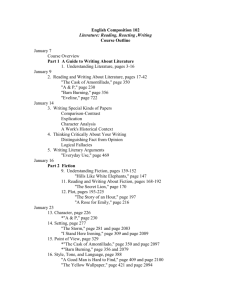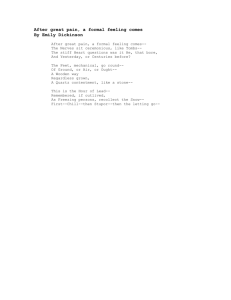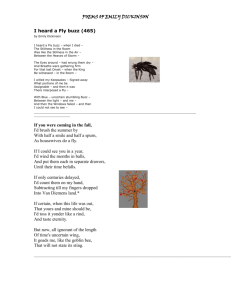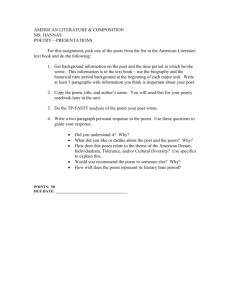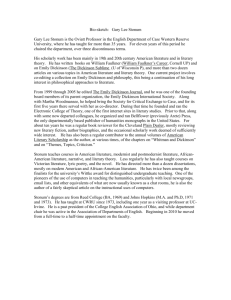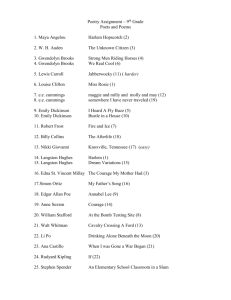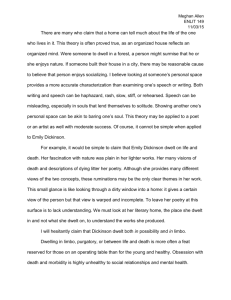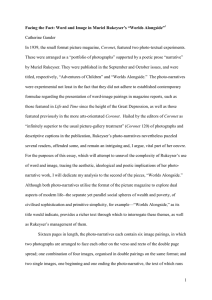English 379K: Women's Writing During Wartime
advertisement
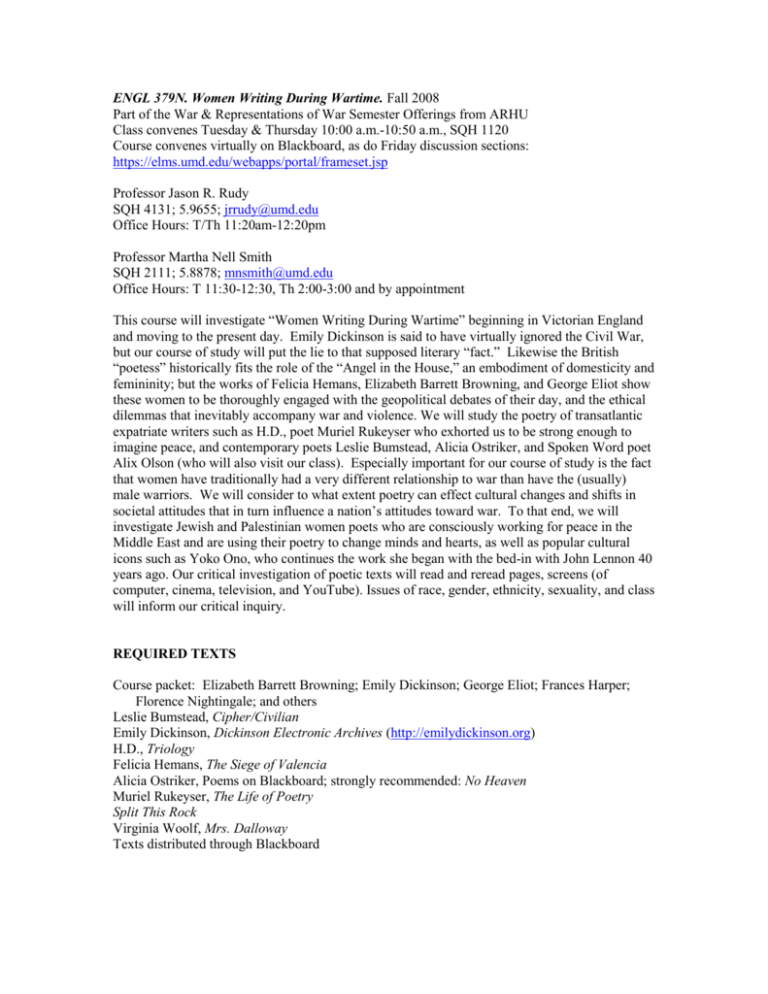
ENGL 379N. Women Writing During Wartime. Fall 2008 Part of the War & Representations of War Semester Offerings from ARHU Class convenes Tuesday & Thursday 10:00 a.m.-10:50 a.m., SQH 1120 Course convenes virtually on Blackboard, as do Friday discussion sections: https://elms.umd.edu/webapps/portal/frameset.jsp Professor Jason R. Rudy SQH 4131; 5.9655; jrrudy@umd.edu Office Hours: T/Th 11:20am-12:20pm Professor Martha Nell Smith SQH 2111; 5.8878; mnsmith@umd.edu Office Hours: T 11:30-12:30, Th 2:00-3:00 and by appointment This course will investigate “Women Writing During Wartime” beginning in Victorian England and moving to the present day. Emily Dickinson is said to have virtually ignored the Civil War, but our course of study will put the lie to that supposed literary “fact.” Likewise the British “poetess” historically fits the role of the “Angel in the House,” an embodiment of domesticity and femininity; but the works of Felicia Hemans, Elizabeth Barrett Browning, and George Eliot show these women to be thoroughly engaged with the geopolitical debates of their day, and the ethical dilemmas that inevitably accompany war and violence. We will study the poetry of transatlantic expatriate writers such as H.D., poet Muriel Rukeyser who exhorted us to be strong enough to imagine peace, and contemporary poets Leslie Bumstead, Alicia Ostriker, and Spoken Word poet Alix Olson (who will also visit our class). Especially important for our course of study is the fact that women have traditionally had a very different relationship to war than have the (usually) male warriors. We will consider to what extent poetry can effect cultural changes and shifts in societal attitudes that in turn influence a nation’s attitudes toward war. To that end, we will investigate Jewish and Palestinian women poets who are consciously working for peace in the Middle East and are using their poetry to change minds and hearts, as well as popular cultural icons such as Yoko Ono, who continues the work she began with the bed-in with John Lennon 40 years ago. Our critical investigation of poetic texts will read and reread pages, screens (of computer, cinema, television, and YouTube). Issues of race, gender, ethnicity, sexuality, and class will inform our critical inquiry. REQUIRED TEXTS Course packet: Elizabeth Barrett Browning; Emily Dickinson; George Eliot; Frances Harper; Florence Nightingale; and others Leslie Bumstead, Cipher/Civilian Emily Dickinson, Dickinson Electronic Archives (http://emilydickinson.org) H.D., Triology Felicia Hemans, The Siege of Valencia Alicia Ostriker, Poems on Blackboard; strongly recommended: No Heaven Muriel Rukeyser, The Life of Poetry Split This Rock Virginia Woolf, Mrs. Dalloway Texts distributed through Blackboard ASSIGNMENTS AND GRADE DISTRIBUTION Participation Group project Quizzes & Responses 20% 20% 20% Final Paper Final Exam 20% 20% Participation in class discussions, the occasional unannounced quiz and in-class writings, participation on the course discussion boards (available under “course tools” on Blackboard), and the mid-term will account for 20% of the final grade. Also, absence is not an excuse for failing to complete any assignment made in class. You should exchange email and other contact information with at least one other course participant so that, in the case of an absence (which we know none of you will want), you have a buddy from whom you can obtain information about assignments and so forth. Two papers: The first is DUE on September 9 and will be 1-2 pages in length; it is considered part of your quizzes and responses, which together will account for 20% of the final grade. The second is due on November 18 and will be 5-8 pages in length; it will account for 20% of the final grade. Both papers will require close textual analysis. For information about proper layout of papers, see formatting requirements below under “Policies.” Papers will not be accepted after the DUE date. Group Project and Presentation: You will work in groups of 4-5 on a project of your own devising. In the last week of classes, you will turn in the result of this work and present to the class (along with your group) on what you have done. A detailed assignment will be forthcoming. This will count for 20% of your final grade. Fun with the Final Exam (if you’ve done the course, we promise!): Tuesday, December 16, 8:00 a.m.-10:00 a.m.: 20% of final grade. POLICIES Participation: Our aim is to make this course as active, invigorating, and student-centered as possible, and each of you is a vital participant if we are to achieve those goals. Because our faceto-face meetings are ongoing conversations, coming to class on time is crucial (NO EXCUSES: consult the Atomic Clock 202.762.1401 and http://www.time.gov, set your watch by it, and be on time). You also need to commit to being well-prepared when you get to class because you will not get nearly as much out of our discussions if you are not. How do you prepare? Bring assigned texts to class with you. Do all assigned readings ahead of time. Keep a reading journal and reflect on the texts before our class meetings. Be ready to ask a question or make a comment, and be courteous to others in the class by listening carefully and responding respectfully. Use the discussion boards and other extra materials made available on Blackboard to review, to brainstorm paper topics, and to prepare your oral presentations. Don’t be shy about coming to office hours. Let us know if you’re having a hard time keeping up with the work or if there’s something you’re just not getting. There truly are no stupid questions, so please don’t hesitate to ask them. Format for papers: Detailed guidelines on assignments will be posted on our course site, but all work written outside of class must be typed in 12-point Times New Roman with one-inch margins at the top and bottom of the page, with page numbers on every page, and in MLA documentation style. (If you are not familiar with MLA style, you should purchase the MLA Handbook for Writers of Research Papers.) Please put the following information in the upper left-hand corner of each paper: Your Name ENGL 379K: Women Writing During Wartime Professors Jason Rudy & Martha Nell Smith Date CENTER Title (e.g., “Emily Dickinson’s Civil War Publications and Representations of the Wounded” or “Enjambment and the Battle for Identity in George Eliot’s The Spanish Gyspy”) Double-space again and start typing your essay. Do NOT use cover sheets, plastic binders, or folders for papers. Please staple your paper together (in the upper-lefthand corner) before bringing it to class. Disabilities: If you have a registered disability that will require accommodation, please let us know right away. If you have a disability and have not yet registered it with Disability Support Services in 0126 Shoemaker (4-7682 or 5-7683 TTY/TDD), you should do so immediately. Academic Integrity: Maryland’s code of academic integrity defines the following acts as “academic dishonesty”: CHEATING: intentionally using or attempting to use unauthorized materials, information, or study aids in any academic exercise. FABRICATION: intentional and unauthorized falsification or invention of any information or citation in an academic exercise. FACILITATING ACADEMIC DISHONESTY: intentionally or knowingly helping or attempting to help another to violate any provision of this Code. PLAGIARISM: intentionally or knowingly representing the words or ideas of another as one’s own in any academic exercise. Demonstrate your commitment to the goal of academic integrity by handwriting and signing the Maryland Student Honor Pledge on all assignments submitted for this course. The text of the pledge is as follows: I pledge on my honor that I have not given or received any unauthorized assistance on this assignment/examination. For further information on the Honor Pledge, see http://www.jpo.umd.edu/aca/FAQ.html] READING SCHEDULE September 2. Course Introduction: course reading and assignment schedule, course policies. Setting out contemporary framework. Women and war: what, if anything, is different about women’s relationships to war? Gertrude Stein, “Reflection on the Atomic Bomb.” September 4. War and Representation: Poetry Engaging the World. Nicholas Kristof, Poetry about war in Iraq (NYTimes). Muriel Rukeyser on war. Excerpts from J. S. Mill, Percy Bysshe Shelley, and Elizabeth Barrett Browning. September 9. War and Representation: Photojournalism and Carnage. Sontag On Photography plus Split This Rock. 1-2 pp. response paper DUE. Group Semester Assignment distributed. September 11. Split This Rock continued. September 12. Discussion Board: review of response papers, looking back, thinking forward. September 16. Institutions in Conflict: Nation & Family. Felicia Hemans, Siege of Valencia. QUIZ on Hemans. September 18. Hemans cont’d. September 19. Group Meeting: formulating a plan for proposing semester project. September 23. Institutions in Conflict: Nation & Family. Elizabeth Barrett Browning, “The Runaway Slave at Pilgrim’s Point.” September 25. Emily Dickinson. “I think I was enchanted” and “It always felt to me – a wrong.” PROPOSAL for Group Project DUE. September 26. Discussion Board: the foreign, the familial, affiliations, estrangements, peace, war September 30. Poetic Voice in a Nation Against Itself. “The Civil War, Class, & the Dickinsons: Emily Dickinson’s Confederate Uncle” (http://www.classroomelectric.org/volume2/smith/). October 2. Dickinson’s “Fascicle 24” and “Scarlet Maryland” (http://www.classroomelectric.org/volume2/smith/f24.html) October 3. Paragraph proposing November 18 paper DUE; respond to proposals. October 7. Roles, Gender, Race, the Civil War. “Gender During Wartime” (part of “Brothers in Arms” http://www.classroomelectric.org/volume2/grossman/gdw.html). Women serving in the Civil War. Women in drag. Sanitary and Christian Commissions. QUIZ. October 9. Selections from Frances Harper. “The Slave Mother,” “Aunt Chloe’s Politics,” and more. October 10. Group Meeting: semester project planning. October 14. Representation Before and Beyond Battle: Breaking Caretakers’ Silences. Mary Secole & Florence Nightingale. QUIZ. October 16. Selections from Helen Hunt Jackson. “The Wall-Flower of the Ruins of Rome,” “The Story of Boon,” and more. October 17. Discussion Board: limits of individualism. October 21. Destruction exceeding Imagination. Joy Harjo, “When the World Ended as We Know It” (September 11, 2001) and remembering “Perhaps the World Ends Here,” at the kitchen table. October 23. Reading Day. October 24. Discussion Board: warmaking, homemaking, and consequences of trauma. October 28. Ethnic Identity and the Individual. George Eliot, The Spanish Gypsy. QUIZ. October 30. Eliot, continued. October 31. Group Meeting: semester project development. November 4. Election Day (class cancelled). November 6. H.D. November 7. Discussion Board. November 11. Alicia Ostriker. Reading Marathon. November 13. H.D. November 14. Discussion Board. November 18. The War Without and the War Within. Woolf, Mrs. Dalloway. ESSAY DUE. November 20. Woolf, continued. QUIZ. November 21. Final Group Meeting: semester project development. November 25. AIDS and its metaphors, disease as war. The Hours, resonances of Mrs. Dalloway. THANKSGIVING (no class Nov. 27th, no meeting or discussion Nov. 28th) December 2. Lest we forget. Vietnam war poetry. Gwendolyn Brooks, Adrienne Rich, Yoko Ono’s “Imagine Peace Tower” project and other women writers/artists, with John Lennon, Amiri Baraka, Allen Ginsberg and more. December 4. Leslie Bumstead and other contemporaries. December 5. Discussion Board. December 9. Group project presentations. December 11. Group project presentations. December 12. Group project presentations. December 16. FINAL EXAM.
